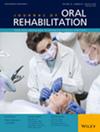Bruxism in Completely Edentulous Patients: A Scoping Review
Abstract
Background
Bruxism is a masticatory muscle activity that can be manifested asleep or awake. It is hypothesised that edentulous patients may also experience bruxism, as dentate patients do. Further investigation is required to provide clearer scientific evidence. Based on this context, this scoping review aims to identify conceptual categories and knowledge gaps about bruxism in completely edentulous patients.
Methods
A scoping review approach was used, and data were reported using the PRISMA-ScR checklist. The studies evaluating bruxism in completely edentulous patients were included without language or time of publication restrictions. The following databases were searched: Cochrane Library, Embase, LILACS, MEDLINE (via PubMed), Scopus, and Web of Science. Additional searching was performed through Google Scholar, ProQuest Dissertations & Theses Global, and ClinicalTrials.gov, as well as expert consultation and manual searches. Three independent authors selected the studies in a two-phase process.
Results
The review's findings comprised three observational studies. Bruxism detection was primarily conducted using self-administered questionnaires and portable electromyographic devices. Contrasting results were found in the muscular activity with prosthesis use, varying between decreased and increased muscular activity during sleep. All studies presented methodological issues that jeopardised further analysis and robust evidence.
Conclusion
Based on limited evidence, our study offers insights into sleep bruxism in completely edentulous patients. The gap in knowledge on the subject hindered further conclusions about bruxism in completely edentulous patients or the influence of dental prostheses on muscular activity. Future studies with better methodology are necessary to understand the characteristics of bruxism in edentulous patients.
Scoping Review Registration
The protocol has been registered prospectively on the Open Science Framework (https://osf.io/ycjnd/) DOI 10.17605/OSF.IO/YCJND.


 求助内容:
求助内容: 应助结果提醒方式:
应助结果提醒方式:


